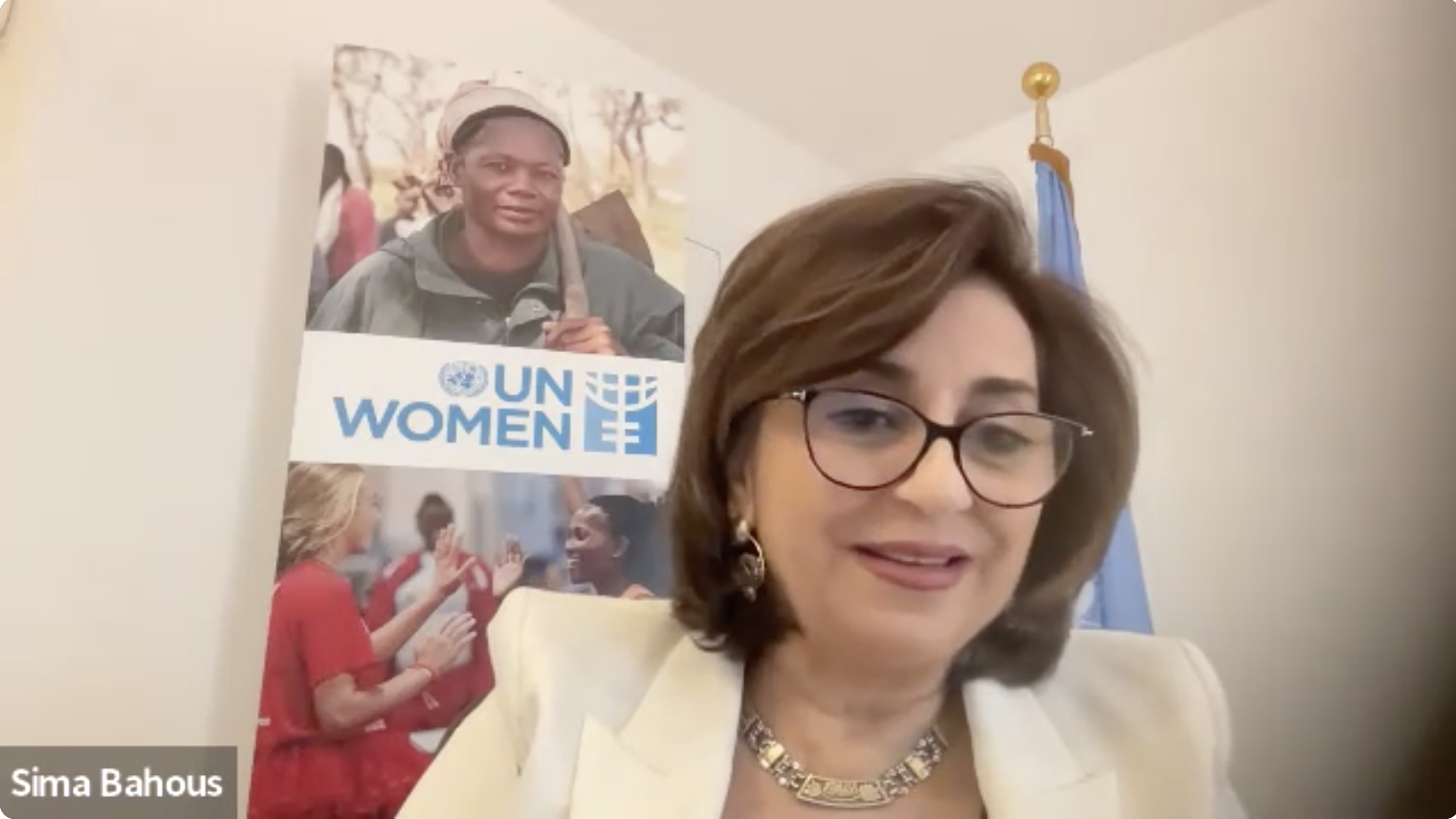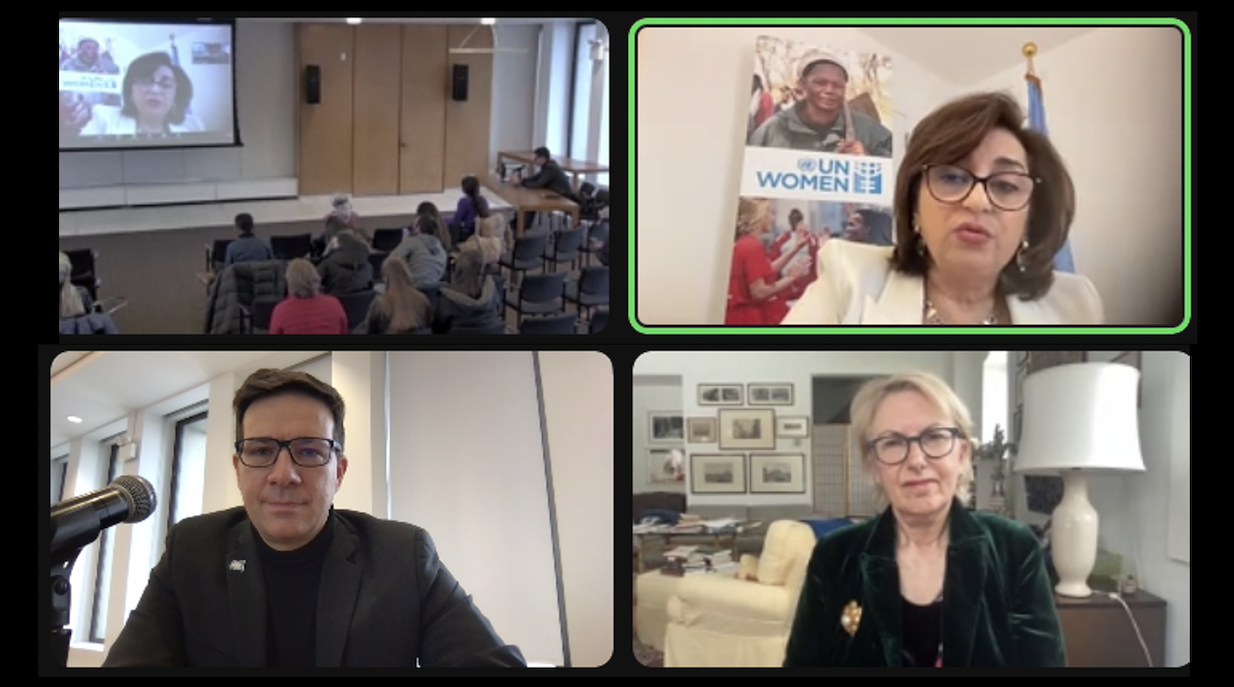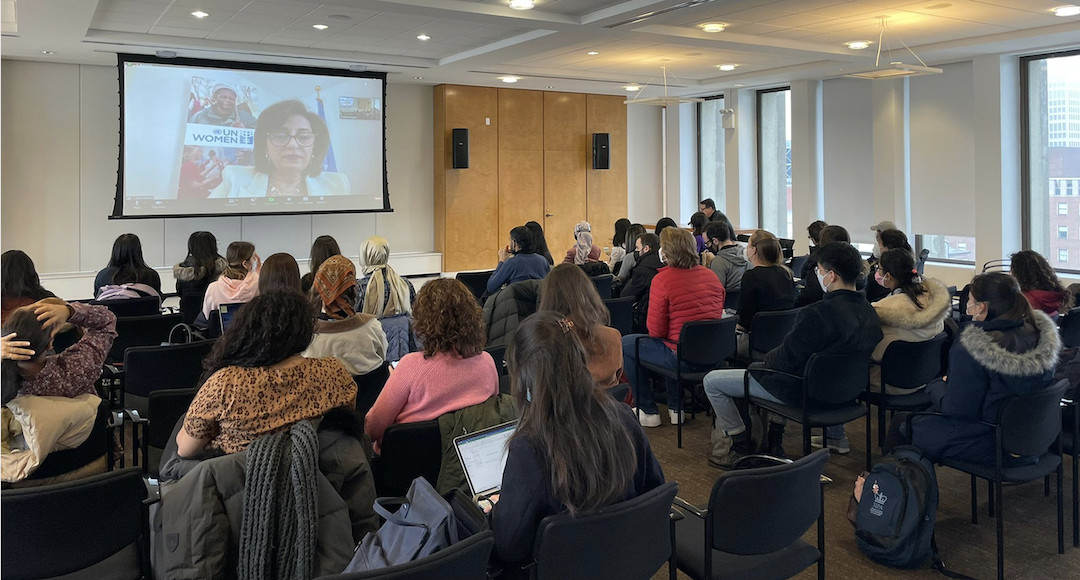Image Carousel with 3 slides
A carousel is a rotating set of images. Use the previous and next buttons to change the displayed slide
-
Slide 1: Sima Bahous, Executive Director of UN Women
-
Slide 2: Sima Bahous, Executive Director of UN Women, Professor Yasmine Ergas, director of SIPA’s Gender and Public Policy specialization and the Institute for the Study of Human Rights, and Professor Daniel Naujoks, interim director of SIPA’s International Organization and United Nations specialization
-
Slide 3: Students attend presentation by Sima Bahous, Executive Director of UN Women



“We do have a great opportunity to move forward now with a new vision, with new aspirations and with new hopes for women around the world,” stressed Dr. Sima Bahous, Executive Director of UN Women in her talk on February 3, 2022 at Columbia University’s School of International and Public Affairs.
Addressing 200 students, faculty, and guests, who had joined the event in-person or online, Bahous shared her vision for the future role of UN Women. In conversation with Professor Yasmine Ergas, director of SIPA’s Gender and Public Policy specialization and the Institute for the Study of Human Rights, and Professor Daniel Naujoks, interim director of SIPA’s International Organization and United Nations specialization, Bahous elaborated on UN Women’s work in the Covid-19 recovery process, the needs of an integrated UN system, UN reform processes, and domestic violence against women and girls.
Among others, Bahous, who had previously directed the United Nations Development Programme’s Regional Bureau for Arab States, emphasized the role of women for the Sustainable Development Goals (SDGs).
“SDG 5 [that focuses on achieving gender equality and empowering all women and girls] is a cornerstone of all the SDGs as a whole. Because without achieving SDG 5, we will not be able to achieve any of the targets of the other 16 SDGs,“ exclaimed Bahous. She continued, “We will not be able to address hunger, nor climate change, nor negotiate durable peace or see an increase in social policies that work for all people, without women engaging in them, being part of them, and leading the discussions as well.”
“UN Women is still a rather new entity … But today, 12 years in, [UN women is] no longer a start-up,” Bahous emphasized. In fact, UN Women has become a thought leader on global standards for achieving gender equality and it houses the largest expertise on gender equality in the UN system.
Bahous presented an overarching view of the Covid-19 impact and its adverse effects on recent progress on gender equality, particularly as women played a critical role in the pandemic response, working on the front lines as healthcare providers and caretakers, taking on additional unpaid domestic work and being squeezed out of the of the labor force. Domestic violence against women and girls persists at unacceptably high levels and is intensified by the pandemic, and women’s equal participation in decision-making processes, including Covid-19 response and recovery, remains limited.
Drawing on her work on the future of global feminism, Ergas shared her favorite move: to find resources and opportunities in crisis. “Does UN Women have the resources–political, institutional, economic–to really leverage this moment to push gender equality forward and to reset the agenda?” asks Ergas? “Can we say that we're on that path?
In Bahous’ opinion, we can say that we are on that path. But she also stressed that the path is not always extremely open to go through. She emphasized that different countries and contexts have different entry points for work on gender equality and women’s empowerment. Bahous shared, “My vision for UN women is simple: Be closer to the people we serve. … Closer in resource allocation, closer in proximity, and most of all, closer in how we do things with them.”
Referring to his own work on interagency cooperation, Naujoks drew attention to the fact that gender mainstreaming is done across the UN system. “What then,” he asked, “is the specific role of UN Women in this crowded multilateral space?”
Bahous explained UN Women’s three-pronged approach to coordinate the work on gender, to push the normative agenda, as well as to engage in operational programming on the ground. Referring to UN Women’s newly adopted Strategic Plan 2022-2025, the agency focuses on the urgent need for a whole-of-system approach to address the root causes of inequality across four thematic areas: governance and participation in public life; women’s economic empowerment; ending violence against women and girls; and women, peace, and security, humanitarian action, and disaster risk reduction.
Bahous acknowledged that the cross-cutting nature of the SDGs requires integration and coordination amongst different pillars of work at the UN. Women are disproportionately affected by climate change, yet are also drivers of climate solutions. For this reason, the upcoming 66th Session of the Commission on the Status of Women in March 2022, will be centered on the theme of “Achieving gender equality and the empowerment of all women and girls in the context of climate change, environmental and disaster risk reduction policies and programmes.”
Having served in senior leadership position at UNDP, at the League of Arab States, as Jordan’s Permanent Representative to the UN and now 5 months into her role as Executive Director of UN Women, Bahous observed: “As a staunched multilateralist … I think we see that multilateralism is getting weaker these days. And we really need all hands on deck to keep it going because this is the only place where the world can convene and can discuss the issues and problems that we have.”
Bahous concluded with a message of hope.
“With the start of 2022, we start with uncertainty, but also with a lot of hope. For there is always hope and there always has to be hope. It is this hope that we will leverage and move forward with. It is a new dawn for UN Women and the UN System, or what we call UN Women 2.0. And with this new dawn, we must come together for women and girls.”
About the Author
Yun Liang ('22) is a graduate student at Columbia University's School of International and Public Affairs (SIPA) concentrating in International Security Policy with a specialization in United Nations and International Organization studies. Her research interests include identity-based conflicts, the prevention of violent extremism, and the promotion of intercultural and interfaith dialogue as a pathway to sustainable peace. Her previous roles include the United Nations Alliance of Civilizations (UNAOC), U.S. Department of Commerce in the International Trade Administration, and U.S. Consulate General in Guangzhou, China.
The views and opinions expressed in this think-piece are those of the authors and do not necessarily reflect the official policy or position of SIPA or Columbia University.
